Saudi Arabia Reiterates Concerns Over Iran Nuclear Activities
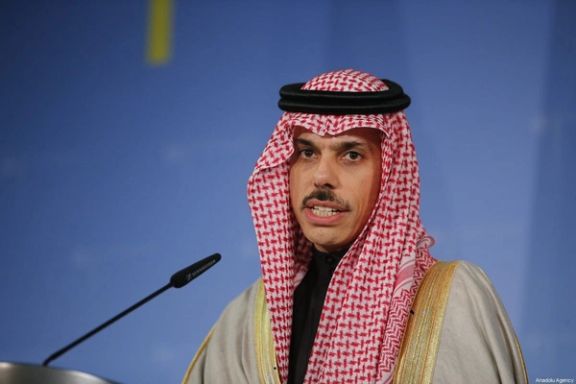
Saudi Arabia’s Foreign Minister Prince Faisal bin Farhan Al Saud has expressed concerns over “transgressions by Iran”, particularly in its nuclear program.

Saudi Arabia’s Foreign Minister Prince Faisal bin Farhan Al Saud has expressed concerns over “transgressions by Iran”, particularly in its nuclear program.
According to al-Arabiya, the visiting Saudi diplomat made the remarks at a joint press conference with Greek Foreign Minister Nikos Dendias in Athens on Tuesday.
Prince Farhan pointed out that Iran's activities don’t match with what Tehran declares about “the peaceful nature” of its nuclear program.
He reiterated Saudi Arabia’s support for international efforts to prevent Iran from acquiring nuclear weapons, as Tehran and world powers are negotiating over the revival of their nuclear agreement in Vienna.
Bin-Farhan said that he explained to his Greek counterpart "the Houthi group's threat to international navigation, the latest example of which was the hijacking of a civilian shipat sea."
The Saudi minister made similar comments after his meeting with his Jordanian counterpart Ayman al-Safadi in Amman on Monday, stressing “the importance of intensifying efforts to prevent Iran from acquiring nuclear weapons and make the Middle East free of weapons of mass destruction.”
Riyadh and Tehran held talks last year to reduce tensions with the aim of restoring diplomatic ties broken since January 2016. So far, the talks have been exploratory with no tangible results.
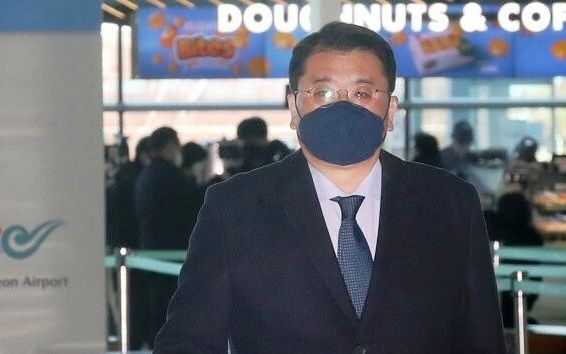
South Korean Vice Foreign Minister Choi Jong-kun has left for Vienna to meet the representatives of Iran and other counties taking part in talks to revive the 2015 nuclear agreement.
According to the Yonhap news agency on Tuesday, the South Korean official will hold meetings with the negotiating parties until Sunday.
South Korea is not directly involved in the talks to revive the 2015 the Joint Comprehensive Plan of Actions (JCPOA), but Seoul has been exchanging views about the Vienna talks because some of Iran’s funds are blocked in its banks because of United States sanctions.
Two South Korean banks hold $7 billion of Iran’s funds from the time when Seoul was purchasing oil from Tehran before full US sanctions on Iran’s crude exports were imposed in May 2019.
In an interview in late December, South Korean ambassador in Tehran Yun Kang-hyeo said US sanctions have harmedhis country’s economy.
Yun told the Iranian Labour News Agency (ILNA) that his country had suffered more than any − other than Iran itself − from ‘maximum pressure,’ under which the US threatens punitive action against anyone buying Iran’s oil or dealing with its financial sector.
US Special Envoy for Iran also held a meeting with the South Korean vice foreign minister in October to discuss cooperation over negotiations to restore the nuclear deal.

Concerns about Russia's role in the Vienna nuclear talks have opened a Pandora's box as Iran’s President Ebrahim Raisi plans to visit Moscow.
Diako Hosseini, a senior international relations advisor at the Center for Strategic Research under President Hassan Rouhani, said Russian negotiators had “cunningly” sidelined Enrique Mora, the senior European Union official chairing formal talks in Vienna between remaining signatories of the 2015 nuclear deal, the Joint Comprehensive Plan of Action.
In a Clubhouse session held by Khabar Online news website Sunday, Hosseini said that while Russia wanted the JCPOA restored, this was not based on Iran’s interests but because military confrontation between the United States and Iran, should the talks fail, would not be in Moscow’s interests.
In a commentary Tuesday in Shargh, a reformist newspaper, former diplomat Javid Ghorbanoghli accused Mikhail Ulyanov, the senior Russian negotiator in Vienna, of interfering in Iran's affairs for claiming Russia and China had convinced Iran to make concessions in the talks.
Ulyanov, who amid a general news blackout has been an active Tweeter, last week entered the debate as to whether current talks – which include formal and informal sessions within the JCPOA structure, and indirect contact with the US, which left the JCPOA in 2018 – are based more on drafts developed by June or on written proposals Iran submitted on November 29.
Speaking to Entekhab news website, Shahriyar Heydari, a member of the parliament's National Security and Foreign Policy Committee, also criticized Ulyanov, demanding an explanation from Ali Bagheri-Kani, Iran's top negotiator. "As far as we know, our negotiation team insists on the country's demands and has not changed its stances."
While Iran has since talks began back in April insisted that formal meetings remain within JCPOA structures and be committed to restoring the 2015 agreement, some in Tehran have argued for direct contacts with the US, as occurred for two years leading up to the JCPOA being signed in 2015.
Ulyanov and representatives of the western European JCPOA signatories – France, German and, the United Kingdom – all meet US officials. The Russian envoy has Tweeted photos of his meetings with White House officialRobert Malley, who leads Washington’s team in Vienna.
"The public's reading of this photo [of Ulyanov and Malley] … naturally implies a paternalistic Russian role in the Vienna talks," Ghorbanoghli said. "Moscow is (and was) concerned that the nuclear deal could be the starting point for improvement in Iran and US relations," Ghorbanoghli wrote, adding that in his view both Russia and Israel preferred Tehran-Washington antagonism to continue as it restricted Iran's options.
In an interview leaked in April, Mohammad Javad Zarif, then foreign minister and an architect of the JCPOA, criticized Russia’s role over the agreement and pointed to the absence of Russian Foreign Minister Sergei Lavrov in the group photo taken after the deal was signed.
Zarif, who was sanctioned by the US in 2019, said he resorted to "rude and non-diplomatic language" with Lavrov on some occasions.In August, conservative former lawmaker Ali Motahari said Russia was trying to sabotage the Vienna talks to prevent Iranian rapprochement with “the West.”
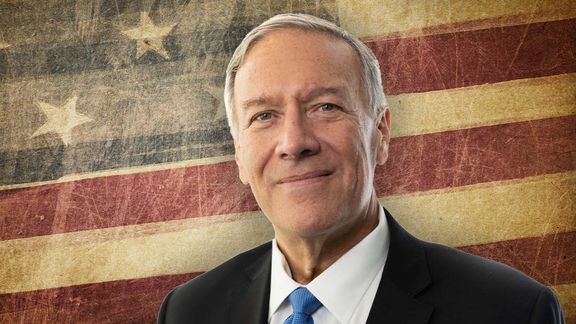
While Iran is repeating threats of retribution and legal actions against those involved in the killing of Qasem Soleimani, former American officials are defending the Trump administration action.
In a tweet on Tuesday, Mike Pompeo, the former CIA director, and secretary of state under Donald Trump, defended the operation to kill Soleimani, saying that it was a legal military action to save the lives of Americans.
He added that Soleimani was actively plotting against the US, and urged the current administration to keep all Americans safe against the threats from the Islamic Republic.
His remarks echoed a post by the former US ambassador to the United Nations, Nikki Haley, who called Soleimani the world’s deadliest terrorist.
She claimed that the world is a safer place now because of Trump’s decision.
After the assassination January 2020, the incumbent US president stated that Soleimani deserved to be brought to justice for his crimes against American troops and thousands of innocents throughout the region as he supported terror and sowed chaos. Current President Joe Biden, however, called it a hugely escalatory movethat would prompt more attacks by Iran in the future.
Soleimani was killed in a United States drone attack, ordered by former president Trump, as he arrived at Baghdad airport from Syria. He was Iran’s top military and intelligence operator in the Middle East, organizing proxy forces.
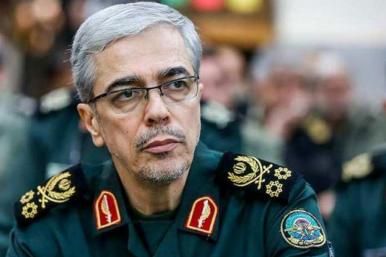
Iran’s armed forces chief of staff in an implicit threat said Tuesday that wherever there is a trace of Gen. Qasem Soleimani “things will happen” to weaken the United States and “Zionists”.
General Mohammad Bagheri, who was speaking at a gathering on the second anniversary of Soleimani’s targeted killing by the US, said, “After Gen. Soleimani’s martyrdom we witnessed how the Americans escaped from Afghanistan in humiliation and were not even able to evacuate their allies and spies.”
Bagheri added that the US is “struggling to deceptively remain in Iraq”, but they will not succeed. The Americans will also be forced to leave Syria, he said and added, “Wherever there is a trace of martyr Soleimani things happen, and we will witness the weakening of the Zionists and the Americans, thanks to the blood Soleimani shed.”
The chief of staff praised Soleimani’s role in expanding the “resistance front”, a term used by Tehran to refer to its network of proxies and allies in the region. He emphasized that before Soleimani became the commander of the Qods Force, Iran’s proxy groups did not have “even one hundredth” of their current capabilities.
Bagheri insisted that Soleimani was a soldier for Supreme Leader Ali Khamenei and carried out his orders to create forces that would weaken Israel.
Soleimani was killed by a US drone strike on January 3, 2020.
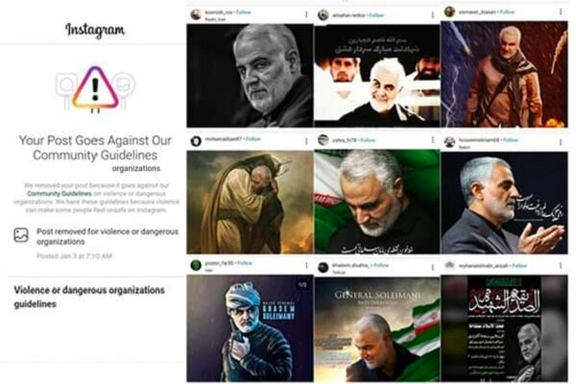
Iran has written to Mark Zuckerberg, CEO of Meta Inc. that controls Facebook and Instagram, asking why the platforms had removed posts about general Qasem Soleimani.
In a letter Reza Fazel, legal director at the telecommunications ministry, called on Zuckerberg as chief executive of Meta Platforms "to end extensive censorship" over Soleimani, who was killed alongside nine others by a United States drone attack in Baghdad on January 3, 2000.
The letter coincided with the anniversary of the general’s death, who was Iran’s top military and intelligence operator outside its borders and was in charge of supporting and organizing militant proxy forces throughout the Middle East.
A statement from the telecommunications ministry said copies of the letter had been sent to Adam Mosseri, head of Instagram, and Jessica Rosenworcel, chairwoman of the US Federal Communications Commission.
Iran itself has one of the world’s worse internet censorships, with tens of thousands of websites blocked since the early 2000s and social media platforms such as Twitter and Facebook banned.
In April 2019, Instagram deleted accounts of many current and previous Iranian Revolutionary Guards (IRGC) commanders, including Soleimani, after the US designated the IRGC a ‘foreign terrorist organization.’ When Soleimani was killed, Instagram removed photos and texts posted in praise of the Qods (Quds) Force commander.
The ministry’s letter called Soleimani "a hero in the fight against terrorism" and "eradicator of Daesh [the Arabic acronym for Isis] terrorist group.” It claimed that the deletions did not conform to any international norm and that Instagram should “respect the millions of users who hold dear this hero of the fight against terrorism, and put an end to this extensive censorship.”
The letter suggested the move had “been part of the Trump administration's psychological war against Iran," referring to former president Donald Trump, who took the decision to kill Soleimani and those travelling with him. Fazel demanded an explanation for the continuing ‘censorship’ and called for the restoration of suspended accounts and deleted posts.
President Ebrahim Raisi (Raeesi) said Monday in a televised speech that unless Trump and former secretary of state Mike Pompeo were put in trial in a “fair court” for Soleimani’s killing – which then United Nations special rapporteur Agnes Callamard dubbed unlawful – “Muslims will take our martyr's revenge.”
Supreme Leader Ali Khamenei said Saturday that “Trump and others like him” would “be forgotten and lost in the dustbin of history, albeit after paying for their crimes in this world."
Instagram, the only major social network not blocked, has around 45 million users in Iran, with a recent surveyby the Iranian Students Polling Agency (ISPA) finding 45 percent of Iranians aged 19 or older had accounts. Facebook , which is blocked in Iran, has millions of subscribers who use anti-filtering software and VPNs.
Iran’s Parliament dominated by hardliners is reviewing a bill to further restrict internet access by requiring foreign social networks and messaging applications to agree to rules set by a regulator. Those not complying would remain blocked.